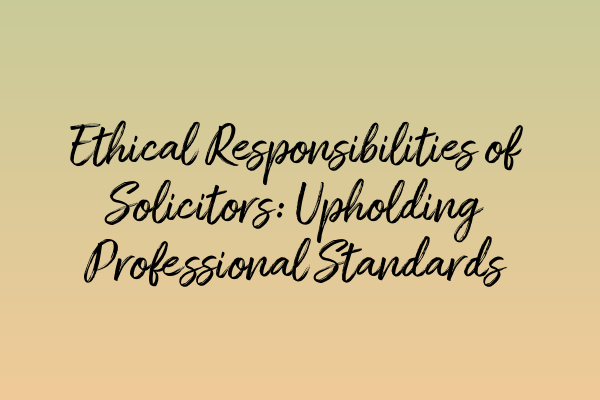Title: Ethical Responsibilities of Solicitors: Upholding Professional Standards
Introduction:
As legal practitioners, solicitors play a crucial role in upholding the principles of justice, fairness, and ethics in society. With their extensive knowledge of the law, solicitors shoulder significant ethical responsibilities, ensuring the integrity of the legal profession and fostering trust between clients and legal practitioners. In this blog post, we will delve into the ethical responsibilities of solicitors and the importance of upholding professional standards.
1. Client Confidentiality: Safeguarding Trust and Privacy
Maintaining client confidentiality is one of the fundamental ethical responsibilities of solicitors. Clients must feel assured that their discussions and information will be treated with the utmost confidentiality. Solicitors are bound by professional rules and regulations to protect the sensitive information shared by their clients. Upholding client confidentiality promotes trust, enabling clients to confide in their legal representatives without fear.
2. Conflict of Interest: Acting Impartially and Loyally
Solicitors must navigate potential conflicts of interest carefully. It is essential for solicitors to avoid situations where personal, professional, or financial interests could compromise their ability to act impartially on behalf of clients. By eliminating or managing conflicts of interest, solicitors maintain their loyalty to clients, ensuring zealous representation and upholding the integrity of the legal process.
3. Competence and Continuing Education: Delivering Quality Service
Solicitors have a duty to provide competent legal services to their clients. The legal landscape is constantly evolving, and solicitors must stay updated with legal developments to serve their clients effectively. By investing in continuing education, solicitors gain the necessary skills and knowledge to handle complex legal matters and provide high-quality representation.
4. Honesty and Integrity: Truthfulness and Trustworthiness
Honesty and integrity lie at the core of a solicitor’s ethical responsibilities. Solicitors must be transparent and truthful with their clients, the court, and opposing parties. By maintaining a reputation for honesty and integrity, solicitors strengthen public trust in the legal profession. Acting with integrity also includes disclosing any conflicts of interest promptly, ensuring the integrity of legal proceedings.
5. Professional Conduct: Adhering to Legal and Ethical Standards
Solicitors are bound by a code of conduct that sets out the professional and ethical standards they must follow. This code of conduct encompasses various aspects, including client care, duty to the court, avoiding discrimination, and maintaining professional relationships. By adhering to these standards, solicitors promote fairness, equal access to justice, and respect within the legal profession.
Conclusion:
As guardians of justice and advocates for their clients, solicitors play a vital role in upholding ethical responsibilities and professional standards. By safeguarding client confidentiality, managing conflicts of interest, maintaining competence, and acting with honesty and integrity, solicitors ensure the trust and confidence of their clients and the wider society. Upholding these ethical responsibilities not only benefits individual clients but also contributes to a fair and just legal system that serves the interests of all.


Leave a Reply